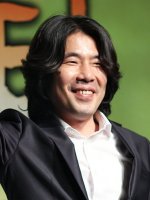Han Suk-kyu is a Actor Sud coréen born on 3 november 1964 at Seoul (Coree du sud)

Han Suk-kyu (born November 3, 1964) is a South Korean actor. One of the leading actors of Korean cinema, Han's notable works include Green Fish (1997), No. 3 (1997), Christmas in August (1998), Shiri (1999), and The President's Last Bang (2005).
After a debut in the 1990 MBC campus drama Our Paradise, Han rose to stardom as "Hong-shik" in The Moon of Seoul (1994), a charming gigolo from the slums determined to attain wealth at all cost in the big city. "Choon-seop", an old friend from hometown played by Choi Min-sik, struggles hopelessly to stop "Hong-shik" from his self-ruin. The partnership of Han and Choi as uneasy allies or foes, parlayed into two flagship films of the 1990s: No. 3 and Shiri. Both the series and "Hong-shik" character have since become beloved icons, as part of the Korean television's golden era before the advent of Korean wave. The cast also features veterans who are now luminaries in Korean cinema: Na Moon-hee of The Quiet Family, Kim Hae-sook of Park Chan-wook's Thirst, and Baek Yoon-sik of Save the Green Planet!.
Before the end of the 20th century, Han headlined films that were critically acclaimed (Green Fish, No. 3) and commercially successful (The Contact, Christmas in August, Shiri -- the latter two making particular impact in Japan).
Han's experience in the early stages of Korean cinema renaissance in the 1990s, cemented his belief in a script-driven model for movie-making. Thus the founding of "Makdong Script Festival" (named after his role in Green Fish), with co-sponsor film magazine Cine 21. Winners may claim two cash prizes funded by Han, with the potential to launch directing careers based from their own scripts. The annual contest is now extant over 10 years, with two titles produced so far: the comedy 2424 (2002) and Private Eye (2009) starring Hwang Jung-min.
Return
Han went into an extended hiatus in 1999, declining several lucrative opportunities with name directors. Among them: Peppermint Candy, Joint Security Area, Sympathy for Mr. Vengeance (as the father), and Fulltime Killer (as Andy Lau's friend/foe.)
The break coincided with a surge in new talent, sophistication of technology, organization, and scale of production within the Korean film industry. Combined with other factors (such as his aloof and shy attitude towards the media, his over-exposure as a sensitive, bookish bourgeois typified by Maxim coffee commercials, and enduring actor's image as a cold intellectual incongruous with the rising vogue of populism defined by explosive passions of red-blooded machismo and sentimentalism, in a market of changing audience preference for a less measured, more corporeal acting style) have attempted to explain the lukewarm reception to his comeback.
Double Agent, which netted one million admissions, was seen as a failure for a star labeled by the media as "box office guarantee." This was followed by a sizable backlash from netizens and the press, who rushed to bury the co-self-produced spy thriller as the public disgrace of a former golden boy.
His press and image took further beating in the next two, even more polarizing films: the unforeseen tragedy surrounding The Scarlet Letter, and the incendiary political content of The President's Last Bang. Nonetheless, these controversial works screened at Cannes, and were featured in a tribute to the actor at the Austrian FilmAsia festival.
In spite of this rocky return to feature films, Han remains well regarded by such major directors as Park Chan-wook, Lee Joon-ik, Kang Woo-suk and Jang Jin. Compared to his peak popularity in the 90s, his work may seem an acquired taste for general audiences, although some cult following ensued for his ultra-sadistic turn in A Bloody Aria.
He also remains well respected among major peers for his distinctive style (a cerebral and intricate minimalism driven by semantics and implosive restraint): Kim Hye-soo, Song Kang-ho, Oh Dal-su (especially for their collaboration in Forbidden Quest and A Bloody Aria), Sol Kyung-gu, and Choi Min-sik.
Overall, his post-90s career is marked by less high-profile, "event" projects than personal interests, such as appearing in the quickie B-movie Mr. Housewife as keepsake for his children. As in the late 90s, Han continues to favor novice directors over safer projects under seasoned directors, in hopes of bringing new talents into the industry. This, combined with aversion of the press (now playing a more critical and complex role to the entertainment circle), has earned him the image by turns of a taciturn loner, and a generous if loquacious intellectual.
He remained self-managed until as late as 2006, before joining the KM Culture agency due to increased regimentation of the industry.
After the adaptation of Keigo Higashino novel of White Night starring Son Ye-jin, Han has a long-awaited reunion with Choi Min-sik slated to begin production in Autumn 2009.
Influences
Known for his distinctive voice and diction, Han has been a long-time mentor to Kam Woo-sung, including coaching the latter's enunciation for his film debut in Marriage is a Crazy Thing. Actors of the younger generation also continue to cite him as an influence; among them: Hwang Jung-min, Ryoo Seung-bum, Kim Myung-min, Kim Joo-hyuk of Blue Swallow, Kim Ji-soo of This Charming Girl, Tsuyoshi Kusanagi (who famously began a second career in Korea after seeing Han in Shiri), Rain, Lee Sung-jae of Barking Dogs Never Bite, TV heartthrob Lee Jin-wook, and the current darling of independent films, Im Ji-kyu.
For his part, Han has cited influences by legendary Korean actor Kim Seung-ho, Al Pacino, Ken Takakura, The Godfather trilogy, and Hayao Miyazaki.
Source : Wikidata
Han Suk-kyu

Han Suk-kyu (born November 3, 1964) is a South Korean actor. One of the leading actors of Korean cinema, Han's notable works include Green Fish (1997), No. 3 (1997), Christmas in August (1998), Shiri (1999), and The President's Last Bang (2005).
Biography
Han Suk-kyu is known as a family man, avid golfer, fisherman and voracious reader. He collects animation by Studio Ghibli and hopes to join Ghibli voice cast one day as a Korean-speaking character. While a student at the Theater and Film department of Dongguk University, he sang in an amateur folk rock band. He took a brief, year-long contract as voice actor at KBS, before moving on to TV and film acting.After a debut in the 1990 MBC campus drama Our Paradise, Han rose to stardom as "Hong-shik" in The Moon of Seoul (1994), a charming gigolo from the slums determined to attain wealth at all cost in the big city. "Choon-seop", an old friend from hometown played by Choi Min-sik, struggles hopelessly to stop "Hong-shik" from his self-ruin. The partnership of Han and Choi as uneasy allies or foes, parlayed into two flagship films of the 1990s: No. 3 and Shiri. Both the series and "Hong-shik" character have since become beloved icons, as part of the Korean television's golden era before the advent of Korean wave. The cast also features veterans who are now luminaries in Korean cinema: Na Moon-hee of The Quiet Family, Kim Hae-sook of Park Chan-wook's Thirst, and Baek Yoon-sik of Save the Green Planet!.
Before the end of the 20th century, Han headlined films that were critically acclaimed (Green Fish, No. 3) and commercially successful (The Contact, Christmas in August, Shiri -- the latter two making particular impact in Japan).
Han's experience in the early stages of Korean cinema renaissance in the 1990s, cemented his belief in a script-driven model for movie-making. Thus the founding of "Makdong Script Festival" (named after his role in Green Fish), with co-sponsor film magazine Cine 21. Winners may claim two cash prizes funded by Han, with the potential to launch directing careers based from their own scripts. The annual contest is now extant over 10 years, with two titles produced so far: the comedy 2424 (2002) and Private Eye (2009) starring Hwang Jung-min.
Return
Han went into an extended hiatus in 1999, declining several lucrative opportunities with name directors. Among them: Peppermint Candy, Joint Security Area, Sympathy for Mr. Vengeance (as the father), and Fulltime Killer (as Andy Lau's friend/foe.)
The break coincided with a surge in new talent, sophistication of technology, organization, and scale of production within the Korean film industry. Combined with other factors (such as his aloof and shy attitude towards the media, his over-exposure as a sensitive, bookish bourgeois typified by Maxim coffee commercials, and enduring actor's image as a cold intellectual incongruous with the rising vogue of populism defined by explosive passions of red-blooded machismo and sentimentalism, in a market of changing audience preference for a less measured, more corporeal acting style) have attempted to explain the lukewarm reception to his comeback.
Double Agent, which netted one million admissions, was seen as a failure for a star labeled by the media as "box office guarantee." This was followed by a sizable backlash from netizens and the press, who rushed to bury the co-self-produced spy thriller as the public disgrace of a former golden boy.
His press and image took further beating in the next two, even more polarizing films: the unforeseen tragedy surrounding The Scarlet Letter, and the incendiary political content of The President's Last Bang. Nonetheless, these controversial works screened at Cannes, and were featured in a tribute to the actor at the Austrian FilmAsia festival.
In spite of this rocky return to feature films, Han remains well regarded by such major directors as Park Chan-wook, Lee Joon-ik, Kang Woo-suk and Jang Jin. Compared to his peak popularity in the 90s, his work may seem an acquired taste for general audiences, although some cult following ensued for his ultra-sadistic turn in A Bloody Aria.
He also remains well respected among major peers for his distinctive style (a cerebral and intricate minimalism driven by semantics and implosive restraint): Kim Hye-soo, Song Kang-ho, Oh Dal-su (especially for their collaboration in Forbidden Quest and A Bloody Aria), Sol Kyung-gu, and Choi Min-sik.
Overall, his post-90s career is marked by less high-profile, "event" projects than personal interests, such as appearing in the quickie B-movie Mr. Housewife as keepsake for his children. As in the late 90s, Han continues to favor novice directors over safer projects under seasoned directors, in hopes of bringing new talents into the industry. This, combined with aversion of the press (now playing a more critical and complex role to the entertainment circle), has earned him the image by turns of a taciturn loner, and a generous if loquacious intellectual.
He remained self-managed until as late as 2006, before joining the KM Culture agency due to increased regimentation of the industry.
After the adaptation of Keigo Higashino novel of White Night starring Son Ye-jin, Han has a long-awaited reunion with Choi Min-sik slated to begin production in Autumn 2009.
Influences
Known for his distinctive voice and diction, Han has been a long-time mentor to Kam Woo-sung, including coaching the latter's enunciation for his film debut in Marriage is a Crazy Thing. Actors of the younger generation also continue to cite him as an influence; among them: Hwang Jung-min, Ryoo Seung-bum, Kim Myung-min, Kim Joo-hyuk of Blue Swallow, Kim Ji-soo of This Charming Girl, Tsuyoshi Kusanagi (who famously began a second career in Korea after seeing Han in Shiri), Rain, Lee Sung-jae of Barking Dogs Never Bite, TV heartthrob Lee Jin-wook, and the current darling of independent films, Im Ji-kyu.
For his part, Han has cited influences by legendary Korean actor Kim Seung-ho, Al Pacino, Ken Takakura, The Godfather trilogy, and Hayao Miyazaki.
Usually with
Filmography of Han Suk-kyu (19 films)
Actor

The Prison (2017)
, 2h5Directed by Na Hyun
Origin Coree du sud
Genres Action, Crime
Actors Han Suk-kyu, Kim Rae-won, Jung Woong-in, Jo Jae-yoon, Shin Sung-rok, Lee Geung-young
Roles Jung Ik-ho
Rating65%





Un ancien policier nommé Song Yoo-gun (Kim Rae-won) se fait incarcérer dans une prison en tant que détenu pour rencontrer un prisonnier connu sous le nom du « Roi » afin qu'il lui révèle la vérité sur la mort de son jeune frère.
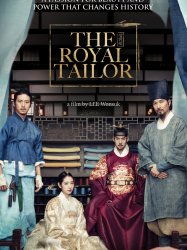
The Royal Tailor (2014)
, 2h7Genres Drama, Historical
Actors Han Suk-kyu, Go Soo, Park Shin-hye, Yoo Yeon-seok, Ma Dong-seok, Shin So-yul
Roles Jo Dol-suk
Rating69%





The film starts with a modern-day press conference, in which Jo Dol-seok is introduced as the only royal tailor, who single-handedly revolutionized the fashion of Korea's Joseon dynasty. Before one of his works is shown, the scene changes to the kingdom of Joseon, where a different story is told: Jo Dol-seok has tailored clothes for three generations of kings before finally becoming the head of the Sanguiwon, the department responsible for the royal attire. Jo was born a commoner, and looks forward to upgrading his social status after serving the royal family for thirty years. Careful to use the traditional rules and patterns, Dol-seok denies the queen's request when she asks him to replace the king's robe that was accidentally burnt by a gungnyeo (female attendant). He insists that to do so would be against court customs, but also simply impossible in the short time before the robe is needed. Anxious to cover her mistake, the queen looks for a designer elsewhere. She is introduced to Lee Gong-jin, a young designer whose good looks and expertise at making unconventional hanboks have charmed many women in the capital; he is portrayed in the film as inventing the bell-shaped design of hanboks and introducing new colors. Gong-jin falls in love with the queen at first sight and uses his extraordinary gift as a tailor to save the dress. He subsequently becomes a tailor at the Sanguiwon and begins a prosperous career. He repeatedly uses his craft to support the queen, who is at risk of being dethroned and replaced because she and the king - who never visits her - have no children.

My Paparotti (2013)
, 2h7Directed by Yoon Jong-chan
Origin Coree du sud
Genres Drama
Actors Lee Je-hoon, Han Suk-kyu, Kang So-ra, Oh Dal-soo, Jo Jin-woong, Kim Ji-seok
Roles Sang-jin
Rating70%





Sang-jin, a formerly promising vocalist, now works as a high school music teacher after suffering from a vocal cord tumor. His ordinary life becomes full of drama when Jang-ho, a local teenage gangster, is transferred to Sang-jin's school. Jang-ho is a thorn in Sang-jin's side, but upon hearing Jang-ho sing, he is deeply impressed with his natural talent and decides to commit to his training. As the two develop their special bond, an unexpected conflict arises between the two gangs in town which forces Jang-ho into a critical situation. Will Jang-ho overcome the obstacles and fulfill his destiny as a world-class vocalist?

The Berlin File (2013)
, 2hDirected by Ryoo Seung-wan
Origin Coree du sud
Genres Drama, Thriller, Action, Spy, Crime
Themes Spy films
Actors Ha Jeong-woo, Jeon Ji-hyeon, Han Suk-kyu, Lee Geung-young, Kwak Do-won, Pasquale Aleardi
Roles Jung Jin-soo
Rating66%





After a tense illegal arms deal in a Berlin hotel involving North Korean spy Pyo Jong-seong (Ha Jung-woo), a Russian broker, and a Middle Eastern terrorist goes wrong when disrupted by unknown assailants, Pyo narrowly escapes but encounters morass of conflicting evidence that may reveal why he was set up.
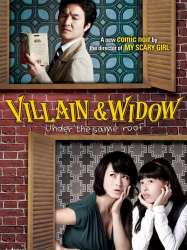
Villain & Widow (2010)
, 1h55Genres Comedy
Actors Kim Hye-soo, Han Suk-kyu, Lee Jang-woo, Um Ki-joon, Park Won-sang, Yoon Hee-seok
Roles Chang-in
Rating63%





Yeon-joo, a depressed widow, lives with her bad-tempered daughter, Seong-ah, who's an ex-child model but is now being bullied in school. Things become worse when she starts to experience financial problems. Now deep in debt, Yeon-joo decides to rent out a room in her house to a mysterious man named Chang-in who introduces himself as a novelist. Unbeknownst to her, Chang-in is a thief who's trying to get his hands on a set of Ming Dynasty tea utensils that her deceased husband stole.

White Night (2009)
, 2h15Genres Thriller, Crime, Romance
Actors Son Ye-jin, Han Suk-kyu, Go Soo, Lee Min-jung, Park Sung-woong, Lee Jong-won
Roles Han Dong-soo
Rating64%





The film starts when Kim Si-hoo, a pawnbroker, is found dead in a remote town in a derelict building, the police are divided whether it was a murder or a suicide.

Eye For An Eye (2008)
, 1h41Genres Drama, Thriller, Action, Crime
Actors Cha Seung-won, Kim Ji-seok, Lee Byung-joon, Han Suk-kyu, Jung In-gi, Lee Joon
Roles Capt. Baek Sung-chan
Rating60%





Veteran police detective Baek Seong-chan is on the verge of retiring to set up his own business. But he is forced to put his plans on hold when ₩1.8 billion is stolen from a bank truck, and then 600 kg of gold from an airport, with the thief having impersonated Baek. The following day he receives a package of the stolen money from the thief, who identifies himself as Ahn Hyeon-min. Baek pursues Ahn, only to discover that he is being used as a pawn in a greater scheme of revenge.
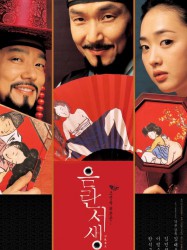
Forbidden Quest (2006)
, 2h19Genres Drama, Comedy, Comedy-drama, Romance
Themes Films about sexuality, Erotic films
Actors Han Suk-kyu, Lee Beom-soo, Kim Min-jung, Oh Dal-soo, Ahn Nae-sang, Kim Roi-ha
Roles Yun-seo
Rating61%





At the start of the film, Kim Yoon-seo, an Inspections officer (police inspector) is seen at his home where his brother has been beaten almost to death. His family wants to submit a false appeal to the king accusing the family of the Deputy Prime Minister, the Lim family. The Lim family had by the past submitted a false appeal against Yoon-seo's family. However Yoon-seo does not wish to submit such an appeal, much to the anger of his elders.

Solace (2006)
, 1h54Genres Romance
Actors Han Suk-kyu, Kim Ji-soo, Choi Cheol-ho, Oh Jung-se, Jung Hye-sun, Lee Han-wi
Roles Shim In-ku
Rating59%





In-ku is a pharmacist who runs his own store in Seoul. Although approaching middle age, he still lives with his elderly mother and mentally disabled older brother, In-seob. In-ku spends much of his time caring for his brother, and in the recent past had to end a relationship with his girlfriend, as her parents would not accept In-seob into their family. Hye-ran earns a living by selling fake designer clothes on a stall in Seoul's Dongdaemun shopping mall, a practise which has led to trouble with the police on several occasions. She is also saddled with a crippling debt, inherited from her now-deceased father.
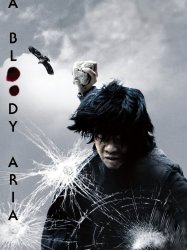
A Bloody Aria (2006)
, 1h55Directed by Won Shin-yeon
Genres Drama, Thriller, Comedy, Action, Horror, Crime
Actors Lee Moon-sik, Han Suk-kyu, Oh Dal-soo, Kim Shi-hoo, Cha Ye-ryun, Lee Byung-joon
Roles Moon-jae
Rating63%





An aspiring opera singer In-jeong travels to countryside with her college professor Yeong-seon. She wants to learn more about the outcome of her audition for a part in an upcoming opera performance. The two park on a deserted riverbank to make a campfire. Instead of talking about the audition, Yeong-seon tries to rape In-jeong who escapes to a forest. Yeong-seon wants to leave but his car gets stuck. Three local thugs with motorcycles discover the car and confront him. Meanwhile, In-jeong stops a man on a scooter who promises to take her to a public transport terminal after they meet his friends who are waiting at the river. As it turns out, he is the leader of the group and takes In-jeong back to the riverbank where she reunites with the scared Yeong-seon but the two do not admit knowing each other. The thugs eat roasted pork and have a small talk with the professor when a young student Hyeon-jae rolls out from a bag that was placed on one of the motorcycles. The thug leader starts harassing the boy. His behavior becomes more psychotic when In-jeong voices her disapproval. He orders the thugs to rape her and forces the student and Yeong-seon to fight until one of them drops. Hyeon-jae knows taekwondo and easily defeats Yeong-seon. He then proceeds to beat the thugs. With all of them unconscious, the boy digs a hole in the ground, buries the men up to their chests and pours gasoline on their heads preparing to set them on fire. Yeong-seon runs for help and In-jeong tries to stop the student. While she's talking to him, the leader regains consciousness and manages to hit the boy with a shovel and escape from the hole. After waking up, one of the thugs beats the injured boy so badly that all believe him dead.

The President's Last Bang (2005)
, 1h42Directed by Im Sang-soo
Origin Coree du sud
Genres Drama, Thriller, Comedy, Historical
Themes Spy films, Politique, Political films
Actors Han Suk-kyu, Baek Yun-shik, Kim Eung-soo, Song Jae-ho, Kim Sang-ho, Jung In-gi
Roles KCIA Chief Agent Joo
Rating68%





Almost the entirety of the film focus on the few hours before and after Park's assassination on October 26, 1979. Undoubtedly the most controversial aspect of the film is its portrayal of Park. In the film, he is shown to be a cowardly libertine, having late-night drinking parties, pawing young women, and in particular having much admiration for Japanese culture, to the point of occasionally speaking Japanese himself.

The Scarlet Letter (2004)
, 1h55Origin Coree du sud
Genres Drama, Thriller, Crime, Romance, Erotic thriller
Themes Films about sexuality, Erotic films, LGBT-related films, Erotic thriller films, LGBT-related films, LGBT-related film, Lesbian-related films
Actors Han Suk-kyu, Lee Eun-ju, Sung Hyun-ah, Uhm Ji-won, Jung In-gi, Kim Hye-jin
Roles Lee Ki-hoon
Rating63%





Lee Ki-hoon is an alpha male homicide detective; intelligent and with animal instincts. His wife, classical cellist Han Soo-hyun, is submissive and seemingly perfect. Meanwhile, he is carrying on a passionate affair with his mistress Choi Ga-hee, a sultry jazz singer at a nightclub. Ki-hoon lives a double life by moving back and forth between these two women, who also happen to be schoolmates from high school. One day Ki-hoon goes to a murder scene and there he meets Ji Kyung-hee, a woman accused of murdering her husband.

Double Agent (2003)
, 2h3Origin Coree du sud
Genres Thriller, Action, Adventure
Themes Spy films
Actors Ko So-young, Han Suk-kyu, Song Jae-ho, Chun Ho-jin, Ryu Seung-soo, Choi Yoon-young
Roles Rim Byeong-ho
Rating62%





June 1980. Rim, a North Korean intelligence officer posted to East Berlin, attempts to cross Checkpoint Charlie with the intention of defecting to South Korea. During his attempt to cross to West Berlin, he is wounded by North Koreans attempting to prevent his defection. South Korean agents successfully retrieve Rim from no-man's land, and congratulate him on his freedom. A week later, Rim is under brutal interrogation by South Korean Intelligence, who suspect he is a spy despite Rim's steadfast denials. Meanwhile, at senior level, a decision is made to allow him to work for South Korean Intelligence, after files brought over from North Korea prove to be authentic.
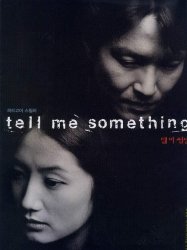
Tell Me Something (1999)
, 1h56Origin Coree du sud
Genres Thriller, Horror, Crime
Themes Serial killer films
Actors Han Suk-kyu, Shim Eun-ha, Jang Hang-sun, Yoo Jun-sang, Yeom Jeong-a, Ahn Suk-hwan
Roles Detective Cho
Rating63%





Tell Me Something is a blood soaked film, although much of the violence occurs off screen. The story begins with a detective Jo returning to work after the death of his mother. He is accused of accepting money from a dubious source to pay for his mother’s medical treatment. He denies the accusation but his career is under a cloud and the film never definitely clears up whether he is innocent of this charge. (Although Jo does seem to allude to this to his friend, Detective Oh, which suggests he is willing to compromise legality in order to follow the higher morality of caring for a loved one.)

Shiri (1999)
, 2h5Directed by Kang Je-gyu
Origin Coree du sud
Genres Drama, Thriller, Action, Adventure, Spy
Themes Spy films, Films about terrorism
Actors Choi Min-sik, Han Suk-kyu, Kim Yoon-jin, Song Kang-ho, Yoon Joo-sang/윤 주 상, Jang Hyun-sung
Roles Yu Jong-won
Rating64%





In October 1992, an elite group of North Korean soldiers are put through a brutal training regime. Under the auspices of their commander, Park Mu-young (Choi Min-sik), they will be sent into South Korea as sleeper agents, to be reactivated at some later date. The most promising of the group is Lee Bang-hee, a female sniper who assassinates several key South Korean figures over the next six years.
 Connection
Connection

